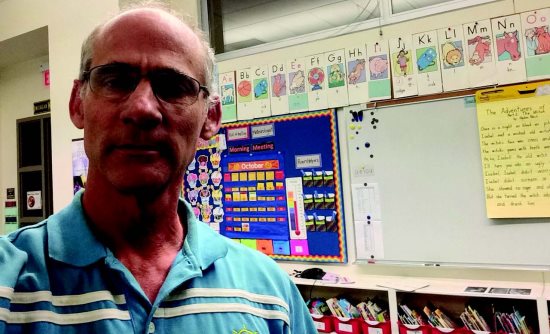
| ||||||
Creek has done what few do: after retiring from Chevron he went back to school to get his teaching credential. This year he got his first class in Oakland, fulfilling an old dream.
The Creeks have lived in Moraga for many years where they raised their two adopted daughters and three biological children. Creek traces his desire to teach lower grades to the time his twin boys were in kindergarten. He remembers the teacher there, a retired high-tech publisher with a white goatee who decided to give back to the children of his community in his golden years. He remembers how well the teacher connected with the kids and what a difference he made in their lives. And this is the core of Creek's motivation: being able to give children a chance to succeed from an early age.
When asked why he would prefer teaching the lower grades, Creek says he believes that when children reach 9 or 10 years old much has already been played out. On the other hand, he says that when kids start going to school a larger number can be reached and turned to a lifelong love of learning. He adds that they might never remember who made that happen for them when they were young, but what counts is the result.
By the end of 2015, Chevron offered some of its executives a nice retirement package in order to "right size" the business. Creek, at 59, decided it was the right time to change careers as he still had, in his words, "some runway." He passed the CBEST and started subbing in the Moraga School District, then the CTEST before enrolling in the Cal State East Bay teaching credential program.
Creek really wanted to go through the training process again. He said he did not find the material particularly difficult to grasp, but it was very interesting and taught by extremely qualified and passionate teachers. He had designed classes for adults as part of his Chevron career, he had managed youth groups as a Cub Master and wilderness trek Scout leader for Troop 234, but there was much for him to learn in terms of pedagogy, psychology and class management. He also enjoyed the other students in his cohort and felt well accepted as the older person in that group.
His dream would have been to teach kindergarten in Lamorinda, but he accepted an offer from La Escuelita Elementary School, teaching first grade in Oakland.
He says that he was scared of the children for the entire first month. He had taught before, of course; it had been part of his curriculum and he had substituted, but it was not his class. The daunting question was, will I be able to control the class and bring it back to a level of calm when the inevitable incidents erupt?
Now getting close to Halloween, Creek has found his marks, has successfully managed a few crises and is indeed in control, working very hard every day at igniting the passion of learning in the young hearts.
Creek's class size is 22 students, a very diverse group in terms of class readiness, abilities, and socio-economic backgrounds. A homeless shelter is located next to the school and one little girl from there was in his class at the beginning of the year; the school is also close to Lakeshore Avenue and its million dollar-plus homes.
He says that all the children in his class are at grade level, with some clearly gifted, especially in science and math. He delights talking about the poems they learn together every week, the hands-on experiments that nourish the students' particular love for science. He talks about Principal Jeffrey Franey and his fellow teachers supporting him and giving him pointers to deal effectively with the children whose behavior is the most disruptive to the class.
Despite the long hours, Creek says he is the first to arrive at school at 7:30 a.m. and the last to leave at 7:30 p.m.; he feels that he is doing what he should. He speaks of what retirement could have been, a few years of extreme hikes and kayak adventures - he is very physically active - a few years of travel, and then what? He says that he does not necessarily feel that he was born to teach; in fact he remembers his engineering years with fondness, but he believes that it is one's duty to live life using abilities to the maximum possible.
Anita Wood-Creek, a recently retired lawyer, says that she might have liked to be able to travel outside of summer vacations with her husband, but she respects his choice, and like their adult children, she is proud of the difference he makes.
Reach the reporter at:
